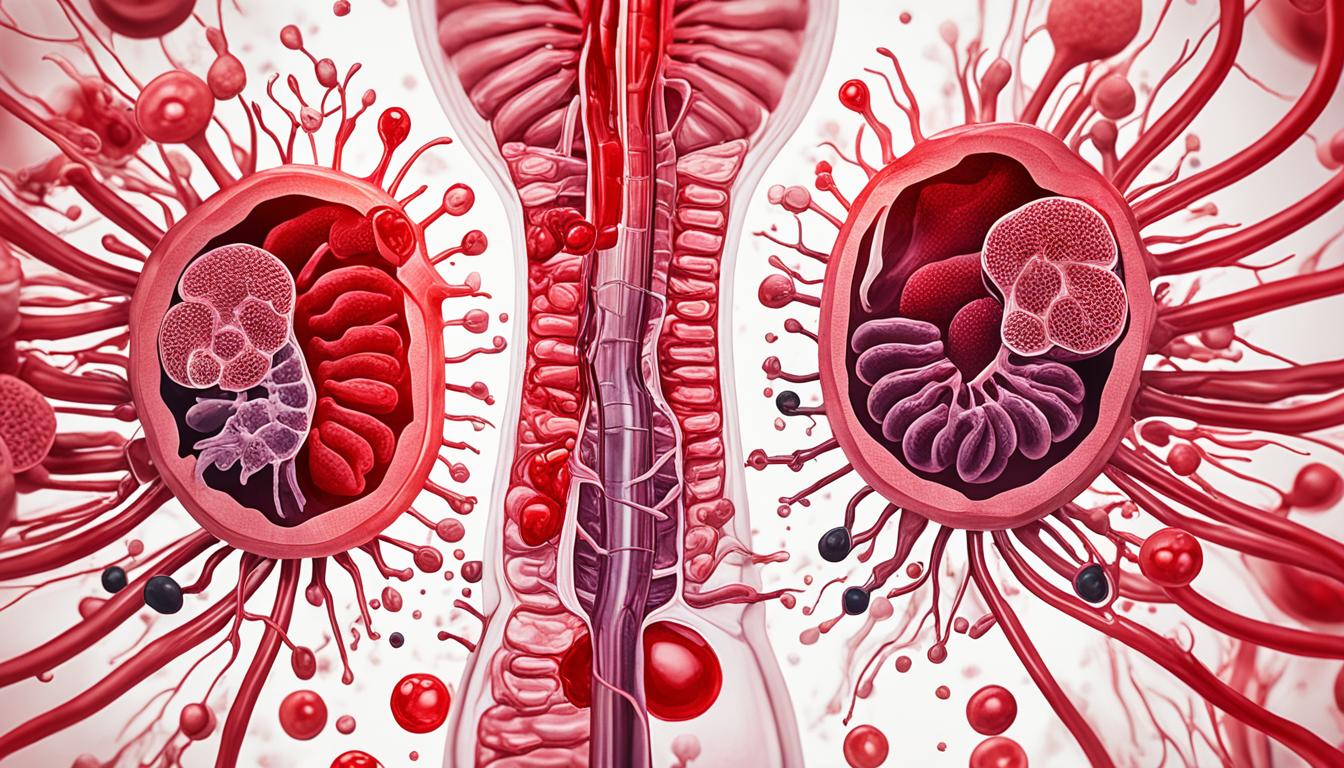Gastrointestinal (GI) bleeding can happen from the mouth to the anus. It ranges from being mild and long-lasting to sudden and life-threatening. Common causes are ulcers, reflux, and cancer. Upper GI bleeding often comes from peptic ulcers, bleeding in the stomach, or swollen blood vessels in the esophagus caused by liver problems. Lower GI bleeding might be from digestive system cancers, diseases affecting the bone marrow, or infections.
The symptoms depend on where and how bad the bleeding is. People may see blood in their stool or vomit blood. They might also feel stomach pain or be very tired. Doctors diagnose this through exams, asking about medical history, and tests like blood tests and imaging. The treatment changes based on the cause and how serious the bleeding is. Sometimes, doctors use stem cell therapy for treatment.
Key Takeaways:
- Gastrointestinal bleeding can occur anywhere in the digestive system and can range from mild to life-threatening.
- Common causes of gastrointestinal bleeding include reflux, ulcers, and cancer.
- Upper gastrointestinal bleeding is often caused by peptic ulcers, acute gastric mucosal lesions, and esophageal varices due to hepatic cirrhosis.
- Lower gastrointestinal bleeding can be caused by neoplasms of the digestive system, bone marrow diseases, and infections.
- Symptoms of gastrointestinal bleeding include blood in the stool, vomiting blood, abdominal pain, and fatigue.
- Diagnosis involves a physical examination, medical history review, blood tests, endoscopy, and imaging tests.
- Treatment options depend on the underlying cause and severity of the bleeding, with stem cell therapy being a potential option.
Causes of Gastrointestinal Bleeding
Gastrointestinal bleeding can come from different parts of the body. Knowing what causes it is key to treating it. Here are some common reasons for this issue:
- Upper gastrointestinal bleeding: It starts from the top parts like the esophagus, stomach, or duodenum. Issues like peptic ulcers or acute gastric mucosal lesions can cause bleeding. Also, esophageal varices from liver cirrhosis are a common reason for it.
- Lower gastrointestinal bleeding: Bleeding in the colon, rectum, or anus is called lower GI bleeding. Things like colorectal cancer, gastrointestinal stromal tumors, or infections can lead to this type of blood loss.
Finding the exact source of the problem is crucial for the right treatment. This may need various tests and a careful look at the patient’s history. Quick diagnosis and proper care can prevent serious issues and help patients get better.
To show the causes visually, here is a table with the common reasons for gastrointestinal bleeding:
| Location | Cause |
|---|---|
| Upper gastrointestinal tract |
|
| Lower gastrointestinal tract |
|
Diagnosis and Stem Cell Therapy for Gastrointestinal Bleeding
Gastrointestinal bleeding shows different symptoms based on where and how bad the bleeding is. You might see bright red or black blood in your stool. If you’re vomiting blood, that’s a sign too. Abdominal pain, fatigue, and weakness also point to this issue.
To figure out if you have this problem, a doctor will do a physical check and look at your medical past. They’ll order blood tests to see if you’re bleeding and to check anemia. Sometimes, an endoscopy is done. This is when a camera is put in your digestive tract to find where the blood is coming from. CT scans or angiography might also be used to look more closely.
The way to fix gastrointestinal bleeding depends on what’s causing it and how severe it is. Occasionally, doctors use stem cell treatment. Stem cells can help fix damaged areas and start the healing process in the gut. Fixing and healing the gut tissues aims to stop the bleeding and make your gut healthier. This new method in gastroenterology is showing hope and might be used more in the future.

